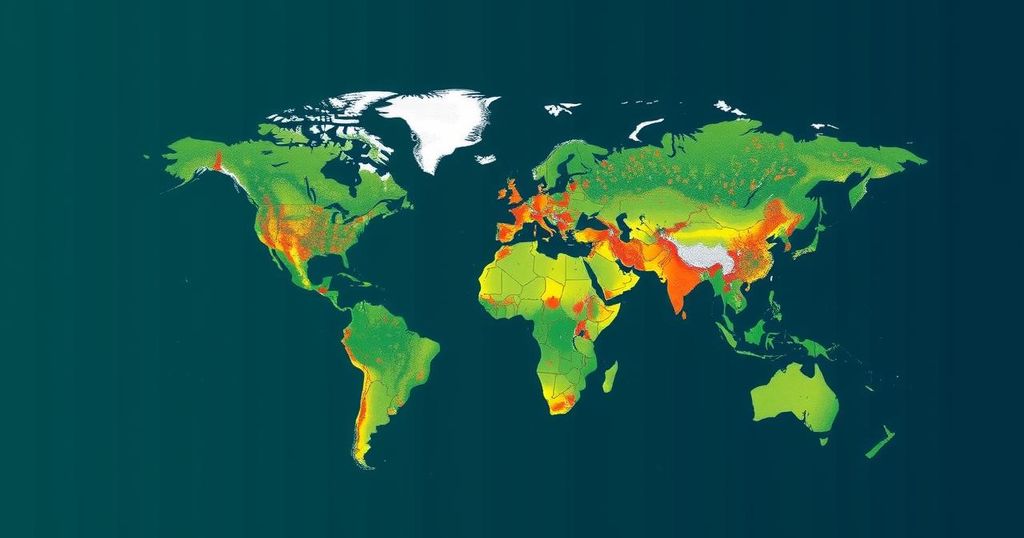Climate change
ASIA, AZERBAIJAN, BAKU, CHINA, CLIMATE CHANGE, DONALD TRUMP, ENVIRONMENTAL POLICY, EUROPE, EUROPEAN, EUROPEAN CLIMATE FOUNDATION, FRANCE, GEOPOLITICS, GLOBAL CARBON PROJECT, GLOBAL WARMING, GREENHOUSE GAS EMISSIONS, LAURENCE TUBIANA, LI SHUO, MEXICO, NORTH AMERICA, PARIS, PARIS AGREEMENT, ROB JACKSON, TRUMP, TUB, TUBIANA, U. S, UNITED NATIONS, UNITED STATES
Fatima Khan
0 Comments
Concerns Mount as Trump 2.0 Threatens Global Climate Action
The anticipated reelection of Donald Trump raises concerns about a significant regression in global climate initiatives, with potential U.S. withdrawal from agreements like the Paris Accord. Experts warn that this may embolden major polluters like China to diminish their climate efforts. Nevertheless, despite these fears, non-federal actors have shown resilience in advancing climate action. The international community will face critical tests at the upcoming U.N. climate negotiations, emphasizing the need for collaborative commitment in the fight against climate change.
The potential reelection of Donald Trump poses significant concerns regarding the global efforts to combat climate change. During his previous term, the United States’ withdrawal from the Paris Agreement prompted other nations, states, cities, and businesses to reinforce their climate commitments; however, experts fear that a second Trump administration would exacerbate the situation. This administration may withdraw further from both the Paris Agreement and the foundational U.N. climate framework established in the 1990s, jeopardizing collective international progress against climate change, particularly with growing emissions worldwide. The global climate crisis continues to escalate, with alarming records of extreme weather phenomena, and doubts loom around the cooperation of major polluters like China, which may use U.S. regression as an excuse to scale back their own efforts. Climate scientists, such as Rob Jackson from Stanford University and Laurence Tubiana of the European Climate Foundation, emphasize the necessity of substantial action from all leading economies to avert reaching perilous temperature thresholds. They indicate that while a Trump administration might challenge U.S. leadership in climate negotiations, the resilience displayed during his first term highlights the capacity of non-federal actors to drive action. With imminent U.N. climate negotiations scheduled to commence in Baku, Azerbaijan, the effectiveness of the international climate framework will be tested, particularly in light of forthcoming national plans due from each country, including the U.S. post-election. The prospect of further U.S. disengagement could undermine consensus-building efforts globally, especially as nations expect solutions collaboratively rather than unilaterally. The recurring cycle of U.S. climate policy shifts under different administrations has led to a sense of fatigue among the global community, which may cause key partners to adapt their strategies accordingly. Despite concerns over potential setbacks, there remains an underlying optimism within the climate negotiation sphere, as actors continue to pursue actionable strategies on the ground. The ongoing need for immediate and decisive action against climate change persists, emphasizing the importance of all countries remaining steadfast in their commitments, regardless of leadership changes in the U.S.
The ongoing battle against climate change has faced numerous hurdles, particularly with the fluctuating policies that arise with different U.S. administrations. Previously, during Donald Trump’s presidency, the United States withdrew from the Paris Climate Agreement, which catalyzed some nations and sub-national actors to take the initiative in climate action. However, concerns are growing that a second Trump term would not only hinder U.S. climate commitments but also influence other nations, especially major polluters like China, to relax their own strategies. The backdrop of increasing global temperatures, extreme weather events, and urgent deadlines for climate action adds to the stakes of upcoming international negotiations.
In summary, the potential second term of Donald Trump poses a formidable threat to global climate initiatives, with fears of increased U.S. withdrawal from critical international agreements. Although past experiences have shown resilience in the global climate movement, the absence of U.S. leadership could significantly hamper collective efforts. Moving forward, it is integral for nations to remain committed to their climate obligations, transcending political changes in leadership, to ensure a sustainable future.
Original Source: www.nationalobserver.com




Post Comment